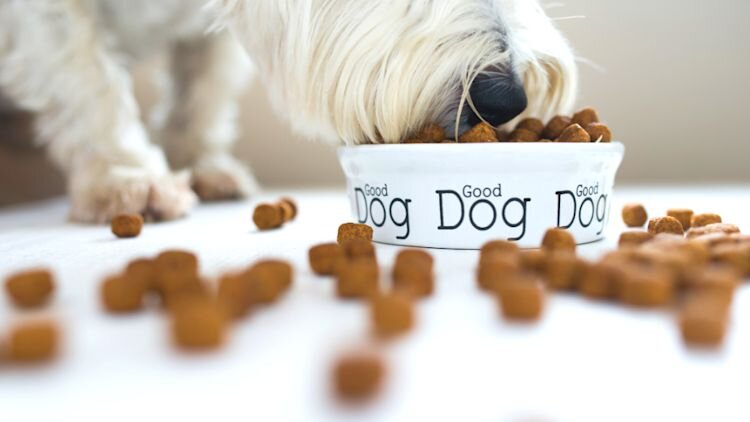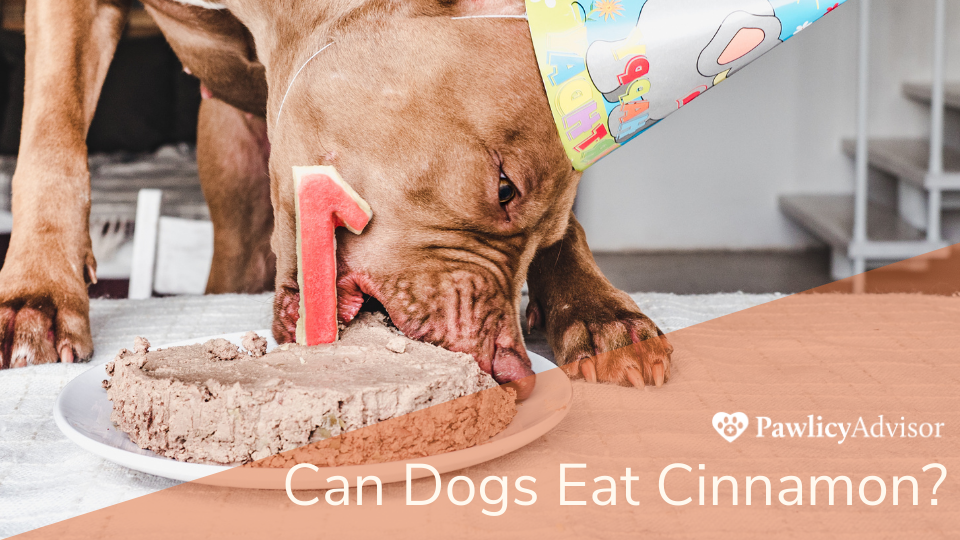Can Dogs Eat Cinnamon? Here's Everything You Need to Know
If you’re making some baked goods, chances are your mouth-watering pup is standing right next to you. But is cinnamon safe for dogs?
The answer is yes, dogs can safely eat cinnamon. Cinnamon offers many health benefits for canines. Pastries and desserts might not be the best food to share with your pup, but there are many cinnamon dog treats they can safely snack on.
Keep reading to find out how cinnamon can benefit your pet, how to incorporate this spice into your pup's diet, and what to watch out for.
Table of Contents:
- Potential health benefits of cinnamon for dogs
- Is cinnamon safe for dogs?
- What are the risks of feeding dogs cinnamon?
- How much cinnamon should you give your dog?
- Can dogs eat cinnamon rolls and other baked goods?
- How to feed your dog cinnamon?
- Key Takeaways
Pro Tip: If your dog manages to get into your cabinets and eats too much cinnamon (or another spice), they might end up with gastrointestinal (GI) issues, among other problems. Having pet insurance can give you peace of mind knowing that you will have financial assistance to visit a vet if their symptoms do not subside.
Potential health benefits of cinnamon for dogs
Even though cinnamon isn’t a necessary addition to your dog’s diet, it is non-toxic and dogs can safely consume it. Here are some of the health benefits this fragrant spice offers for your canine friend:
- Due to its anti-inflammatory properties, cinnamon may help older dogs with arthritis, as well as those struggling with sore muscles, by reducing swelling and managing joint pain.
- Cinnamon is also rich in antioxidants and protects both humans and canines from neurological disorders, while at the same time helping improve brain functions like focus and memory.
- The spice can also improve heart health. In a study published in the Journal of Animal and Veterinary Advances, the dogs that were given cinnamon had significantly lower heart rate and systolic blood pressure than the ones that weren’t given cinnamon.
- Cinnamon can help regulate blood sugar in diabetic pups. Studies have shown that ½ teaspoon of cinnamon per day can help control blood glucose levels and lower insulin resistance. Of course, this doesn’t mean that cinnamon can substitute any medications prescribed by your vet, so be sure to consult with them first.
- Cinnamon also has antibacterial properties, which can help slow down the spoilage of food; all you need to do is sprinkle some cinnamon over the food before putting it in the fridge.
Is cinnamon safe for dogs?
There are two different varieties of cinnamon found in most markets: Cassia cinnamon and Ceylon cinnamon.
Cassia cinnamon comes from the C. cassia tree, found in China, whereas the Ceylon variety comes from the C. verum tree, which grows in Sri Lanka. Cassia cinnamon has a dark brown color, a rougher texture, and thicker sticks. It’s also cheaper and widely available. Ceylon cinnamon is lighter in color and tastes sweeter. Because of its price, it is more difficult to find and is usually available in specialty spice markets and healthy food stores.
Ceylon cinnamon is a better choice for dogs because it contains lower levels of coumarin, a compound that is known to be toxic to the kidneys and liver in humans when ingested in large amounts. Although there’s no information about what amount of the spice can cause kidney or liver toxicity in dogs, it’s best to stay on the safe side and only feed cinnamon in small amounts.

What are the risks of feeding dogs cinnamon?
Even though this spice is technically safe for canine consumption, it doesn't come free from risks.
Cinnamon sticks can cause digestive and skin irritation in both humans and pets, especially if consumed in big amounts. Ingesting ground cinnamon, cinnamon sticks, and cinnamon oil can irritate your pup’s mouth while inhaling cinnamon powder can cause cough, difficulty breathing, and choking.
How much cinnamon can dogs eat?
In most cases, more than one teaspoon of cinnamon powder is needed to cause problems for your dog, but cinnamon essential oil can cause issues in smaller dosages. In addition, small breeds can be sensitive to smaller amounts of cinnamon than large breed dogs.
Cinnamon overdose can result in diarrhea, vomiting, low blood sugar levels, liver disease, and changes in heart rate. If you want to include cinnamon into your dog's diet, be sure to consult your vet first.
If your dog ingested a big amount of cinnamon, you don’t need to panic. The spice isn’t fatal to dogs, but it can cause uncomfortable side effects, which is why you should call your veterinarian.
Pro Tip: An unexpected vet bill for a bad stomach upset or accidental poisoning can present a large financial burden for owners without a valuable pet insurance policy to cover the cost of treatments. Be sure to get your dog insured as young as possible because providers don’t cover pre-existing conditions.
Can dogs eat cinnamon rolls and other baked goods?
While cinnamon is not toxic to dogs, you should avoid sharing cinnamon baked goods with your canine companion. The reason for this is that these baked treats like cinnamon rolls, cinnamon bread, cinnamon toast crunch, cookies, and cakes usually contain many different ingredients that can be dangerous to dogs. The most common ingredients found in these treats include butter, sugar, chocolate or cocoa powder, xylitol, raisins, some nuts, and nutmeg.

Be careful with nutmeg
While nutmeg and cinnamon are complementary spices, you should never give both of them to your dog as nutmeg contains myristicin, a naturally occurring compound found in nutmeg and plants like dill, parsley, and peyote.
Myristicin can be toxic to dogs and cause symptoms like disorientation, increased heart rate, dry mouth, drowsiness, hallucinations, increased blood pressure, abdominal pain, and even seizures. Fortunately, your four-legged pal would have to ingest a large amount of nutmeg (about one to three tablespoons) to experience myristicin poisoning. A small amount of the spice should only cause mild tummy upset.
If you suspect your dog has eaten nutmeg or baked products that contain nutmeg, contact your vet or the Animal Poison Control Center right away.
How to feed your dog cinnamon
As noted above, you should give cinnamon to your pup in small quantities. Half a teaspoon with food from time to time should be enough for your dog to reap all the beneficial properties this fragrant spice has to offer. You could also prepare dog-friendly cinnamon buns or other cinnamon baked treats that your pet will surely enjoy.
Key Takeaways
- When fed in small quantities, cinnamon is safe for dogs and offers a number of health benefits.
- Powdered cinnamon can cause irritation, difficulty breathing, or choking, whereas large amounts of the spice can lead to vomiting and diarrhea.
- Avoid feeding your dog cinnamon-based baked goods as they can contain ingredients that are toxic to dogs, such as chocolate and raisins.
- If you want to incorporate cinnamon into your pet's diet, be sure to consult your vet first.
Do you want to find the best pet insurance?
Let's analyze your pet's breed, age, and location to find the right coverage and the best savings. Ready?
Analyze My PetAbout Pawlicy Advisor
The pet insurance marketplace endorsed by veterinarians, at Pawlicy Advisor we make buying the best pet insurance easier. By comparing personalized coverage and pricing differences we can save you a ton of money, up to 83% in some instances!
Instantly Compare Pet Insurance Plans
Guides
Determine If Pet Insurance Is Worth It
Comparison Charts
Find Your State
Dog Insurance
DVM
Ricky Walther, DVM, is a small animal general practitioner in the greater Sacramento, California area. Realizing the positive financial and medical impact that pet insurance can provide for pet parents and the profession, he lends support and advice to companies like Pawlicy Advisor "The Pet Insurance Marketplace") that simplify the process of connecting with veterinary financing resources.
